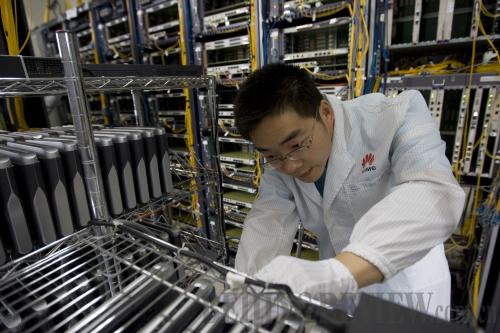|
 |
|
R&D LAB: An engineer handles equipment at Huawei's headquarters in Shenzhen on June 3, 2010 (XINHUA) |
Motives
For Huawei and ZTE, security concerns over their products have been the largest stumbling block on the path of their American expansion. To tackle the situation, Huawei hired a former American official as its chief security officer, and hoped to win trust through an overseas listing, but to no avail.
Shi Yinhong, a professor at the School of International Studies at Renmin University of China, says Chinese enterprises have been suffering from a lack of trust by the U.S. Government, especially when they try to invest in sensitive areas, a reflection of American concerns over a rising China.
"The U.S. Government is sensitive to Chinese investment in fields which it believes may pose a potential threat to U.S. national security, like energy and telecommunications. The obstacle Huawei and ZTE now face might have been expected because the United States has never lowered its guard against Chinese firms wanting to access its hi-tech sector," said Shi.
Jiang Yong, Director of the Economic Security Research Center at the China Institutes of Contemporary International Relations, believes trade protectionism is masquerading as a defense of national security.
"The United States has a long practice of setting up trade barriers against Chinese enterprises. This latest move can be taken as its prolonging protectionist measures adopted after the financial crisis. Now, the targets are Huawei and ZTE, both of which have developed by leaps and bounds in the international market," said Jiang.
Political factors aside, Jiang believes Cisco, a Huawei rival, may be the real impediment facing Huawei and ZTE. According to industry statistics, the growth of the global telecommunication market was a mere 12.2 percent in 2011, far less than the 31-percent growth rate registered in 2010. It is widely believed that the euro-zone sovereign debt crisis, coupled with uncertainties of an economic recovery, will lead to further declines in growth. Under such circumstances, Huawei and ZTE, whose products are more competitively priced, are more appealing to customers. According to Cisco's 2011 financial report, the company saw a drop in its gross profit. Price competition from its Chinese rivals is one factor behind its slackening performance.
Closely connected with the U.S. Government and military, Cisco is an active lobbying group. It is unlikely to sit by and watch its largest rival possibly make inroads in a market it currently dominates.
A jousting with no winner
Nobody knows whether the report published by the U.S. Congress will trigger a telecommunications trade war between China and the United States.
In 2011, the United States took up $1.3 billion, or 4 percent of Huawei's total revenue, and $30 million of ZTE's. Huawei is second only to Ericsson in the manufacturing of routers, switches and other telecom equipment, and ZTE ranks fifth. In contrast, 16 percent of Cisco's revenue comes from the Pacific Rim and China, and for Cisco, China is also the second fastest-growing market in the region after Japan. Currently, China accounts for 30 percent of Cisco's overall profits, while the United States makes up 45 percent. If a trade war breaks out, Cisco would have far more at stake than Huawei.
Furthermore, the report has tarnished the image of the business environment in the United States. In the eyes of Chinese people, the United States is a leader in the free economy. However, its protectionist actions following the financial crisis have been disappointing.
The biggest worry for Huawei and ZTE is not losing the U.S. market but the possibility of U.S. allies following suit.
| 